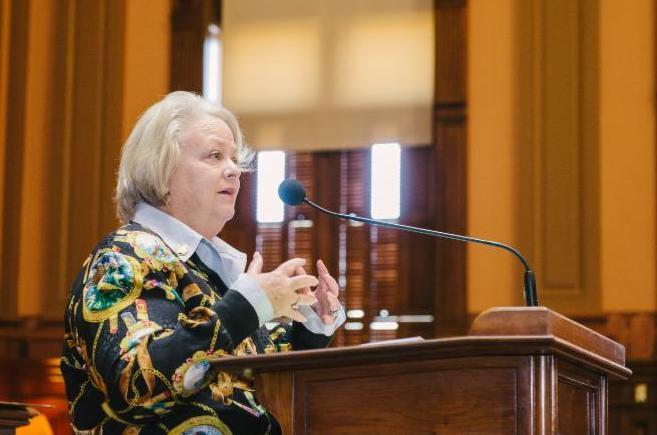Section Branding
Header Content
Opinion: It Is Time To Face Confederate Monument Mythology
Primary Content
*Editor's note: The following commentary is published as submitted and reflects the views of the author and not necessarily Georgia Public Broadcasting as an organization.
This past week, modern technology let me virtually participate as workers dismantled and hauled off for storage the obelisk on the Decatur Square that has honored "the lost cause of the Confederacy” for over 100 years.
I celebrated with my constituents the end of a long political and legal struggle to expose the Decatur monument mythology that “honors” the losers of the Civil War in order to preserve racial segregation and discrimination.
Mostly, I reflected on my role in the recent efforts by the General Assembly to change the law relating to monument removal, but, more importantly, on my own past neglect of a symbol that has caused pain to many of my friends.
DeKalb County State Court Judge Dax Lopez has written eloquently about his experience with monument mythology, encountering the Decatur monument in the front yard of the work office for him and his fellow judges on the DeKalb bench.
I practiced law on the Decatur Square 100 yards from the Confederate obelisk for over three decades and walked by the monument over 1,000 times. As a young lawyer in my 20s, I worked with Georgia Legal Services in most of the rural counties of north Georgia. Every one of those historic courthouses I visited had some form of Confederate lost cause memorial, and I never once paid attention — either in the beginning or afterward in all my trips to court.
I was busy doing important things for my clients, I thought. Reading monument language was not part of my day’s work.
In recent times, I have realized that as an officer of the court, and an engaged citizen, my neglect of the policies supported and perpetuated by courthouse monument mythology was a sin of omission.
A review of the history of the Decatur obelisk erected in 1908 and the Stone Mountain acquisition by the state in 1958 during the term of Gov. Marvin Griffin is essential to understanding our shared history of white control of power over the interests of black citizens.
The more recent legislative action during Gov. Roy Barnes’ administration added to the current political obstacles to removing Confederate monuments. As part of a compromise to change the Georgia flag, the law was changed to eliminate the authority of cities and counties to remove monuments. The state could now make decisions about courthouse art or memorials previously reserved for local leaders.
Creative litigation initiated by the City of Decatur gave DeKalb Superior Court Judge Clarence Seeliger the opportunity to declare the Decatur obelisk a public nuisance and order it removed earlier this month. Judge Seeliger retires this year after a long and distinguished career. His June 12th order illustrates the positive power of smart lawyers and judges, and I am grateful for such excellent public service work in our profession.
Our current times, controversies and tragedies are full of painful examples of the burden of our continuing racial discord. As a legislator, I had a front-row seat for the unintelligible controversy about creating hate crimes legislation and witnessed the power of our flawed and mythologized history.
But under current law, as lawyers and judges, we have more opportunities than legislators to address the local issues of Confederate monuments staining our sacred court squares.
My plea today is that when you next enter your local courthouse, take the time to look for the monuments that surround you and your clients and assess whether these so-called "places of honor" are insulting to Black and Brown citizens. Listen to our friends like Judge Lopez on their views of monuments that celebrate white supremacy.
Engage on the issue.
Public service opportunities come in many forms and there are many needs, but now is the time to face the monument mythology head on. I ask you to join the advocacy efforts to take down the Confederate monuments that reflect the worst chapters of our history.
We welcome commentary pieces from the community. To send us yours, please email ASK@GPB.org with the subject: Voices from the community.

